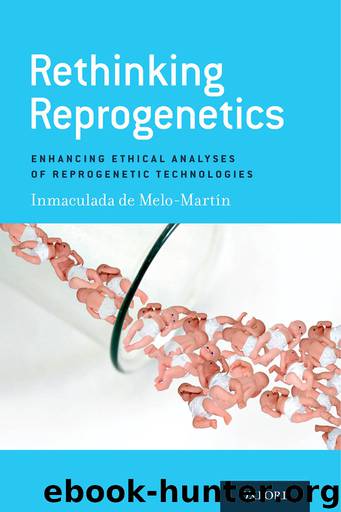Rethinking Reprogenetics: Enhancing Ethical Analyses of Reprogenetic Technologies by Inmaculada de Melo-Martin

Author:Inmaculada de Melo-Martin [de Melo-Martin, Inmaculada]
Language: eng
Format: epub
Publisher: Oxford University Press
Published: 2016-10-02T22:00:00+00:00
When You Are a Hammer, Everything Looks like a Nail
A second reason to doubt proponents’ claims regarding our ability to control the natural lottery of sexual reproduction and natural selection through reprogenetics is that beliefs about such control are the result of scientific misunderstandings. Recall that PGD and gene editing techniques attend exclusively to molecular components. PGD offers information about the presence or absence of certain genetic mutations or variants, whereas gene editing techniques allow DNA to be inserted, replaced, or removed from a genome. Decisions about what children to bring or not bring into the world, however, are grounded on the assumption that they will or will not have particular phenotypic traits. Reprogenetics proponents’ concerns about the dangers of sexual reproduction stem from the fact that it results in phenotypic traits that they believe may decrease people’s well-being. Similarly, their desire to control reproductive processes arises out of a wish to create children with phenotypic traits that proponents consider likely to make the lives of those children—and perhaps of others—better.
But these ambitions of control are grounded on an untenable genetic determinism. To be sure, reprogenetics advocates do not explicitly embrace genetic determinism. On the contrary, they are eager to reject such doctrine (Green 2007, 81–9; Harris 2007, 127; Savulescu et al. 2006; Silver 1997, 367). For instance, in an article defending selection against criminal dispositions, Savulescu and colleagues plainly states:
Both parents who overestimate their child’s likely actions, and law enforcement agencies who underestimate a person’s likely behaviour based on their genes, would be acting on a deterministic understanding of genetics which is false. Even if a deterministic account of behaviour is true, genetics forms only one cause from a very long list of causes which lead to any given behaviour. Our genes, therefore, do not determine our behaviour, even when they are in fact producing known behaviour-altering chemical effect (Savulescu et al. 2006, 166).
In spite of proponents’ explicit repudiation of genetic determinism, though, it is difficult to see how their control motivations could make any sense without such an assumption. One might charitably agree that proponents’ ambition to control does not necessitate some versions of genetic determinism, such as the “complete information” kind, which affirms that our genes dictate everything about us, or the “intervention is useless” type, which asserts that for traits that have a genetic component, intervention is powerless (Kaplan 2000, 11–2). But some form of determinism must be at play in proponents’ dreams of controlling sexual reproduction, and ultimately human evolution, by means of reprogenetic technologies. The degree of influence to which proponents aspire appears possible with these technologies only if one assumes that selection and enhancement practices will reliably have the desired outcomes. If highly predictable results cannot be reasonably guaranteed, then it is hard to see how one might be able to exercise such a degree of control over the dangerous activity that sexual reproduction is said to be.
The focus on genetic aspects found in reprogenetics defenses is, of course, consistent with societal values that emphasize efficiency, control, and quick fixes.
Download
This site does not store any files on its server. We only index and link to content provided by other sites. Please contact the content providers to delete copyright contents if any and email us, we'll remove relevant links or contents immediately.
When Breath Becomes Air by Paul Kalanithi(7304)
Why We Sleep: Unlocking the Power of Sleep and Dreams by Matthew Walker(5692)
Paper Towns by Green John(4203)
The Immortal Life of Henrietta Lacks by Rebecca Skloot(3852)
The Sports Rules Book by Human Kinetics(3623)
Dynamic Alignment Through Imagery by Eric Franklin(3518)
ACSM's Complete Guide to Fitness & Health by ACSM(3488)
Kaplan MCAT Organic Chemistry Review: Created for MCAT 2015 (Kaplan Test Prep) by Kaplan(3446)
Introduction to Kinesiology by Shirl J. Hoffman(3324)
Livewired by David Eagleman(3166)
The River of Consciousness by Oliver Sacks(3015)
The Death of the Heart by Elizabeth Bowen(2931)
Alchemy and Alchemists by C. J. S. Thompson(2930)
Descartes' Error by Antonio Damasio(2765)
Bad Pharma by Ben Goldacre(2752)
The Gene: An Intimate History by Siddhartha Mukherjee(2518)
Kaplan MCAT Behavioral Sciences Review: Created for MCAT 2015 (Kaplan Test Prep) by Kaplan(2506)
The Fate of Rome: Climate, Disease, and the End of an Empire (The Princeton History of the Ancient World) by Kyle Harper(2459)
The Emperor of All Maladies: A Biography of Cancer by Siddhartha Mukherjee(2453)
